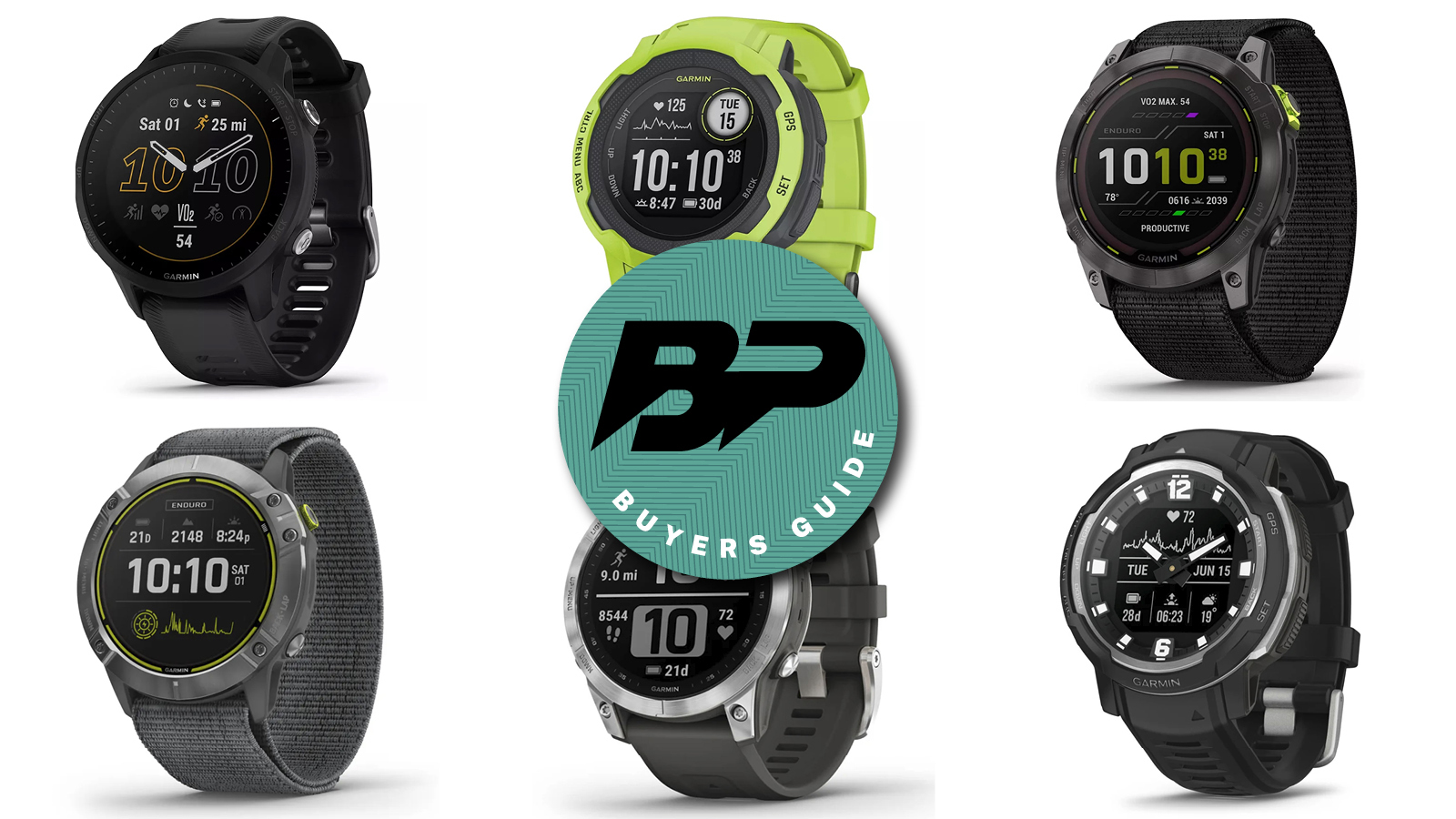
While a GPS bike computer is definitely an excellent ride stats and navigation device for drop bar bikes, a better option for mountain bikers is to use one the best Garmin watches for MTB instead.
The inevitable crashes we encounter on the trails are not great news for bar or frame-mounted computers, as its easy for them to get flung deep into the undergrowth or trashed completely upon impact. Factor in that even a quick glance at your GPS computer while riding a MTB trail can massively multiply the chances of a crash happening, and we'd rather spend our money elsewhere.
This makes a wrist mounted smartwatch a safer and often cheaper option for recording your rides, and with the best Garmin watches for MTB, you of course get the bonus of day-to-day health tracking and use for recording other sports too. Though if you're still unsure which type to choose, take a look at our deeper dive into bike computer vs smartwatch.
We've tested the watches here in a range of riding conditions that covers everything from cold, sloppy and sodden to baked, battered and dusty. Our experts have assessed six of the best Garmin watches for MTB, with the Forerunner 955 coming out as our top pick, and the Instinct 2 Solar our best value option.
The best Garmin watches for MTB
The top 6
Best overall
Packs excellent mapping and tracking with advanced training features into a compact, bombproof package.
Best for value
The second gen Instinct has all the features you need and comes in a rugged package with a budget-friendly price tag.
Best for multi-day riding
All day rides will barely put a dent in the exceptional battery life. Mapping and training features are excellent too.
Best no frills performance
Seriously impressive battery life and a solid feature collection, but mapping is very basic.
Best feature packed
Advanced training tools and a useful touchscreen, plus excellent GPS and mapping features.
Best hybrid model
A quirky watch with an innovative blend of traditional, analog looks and smart functionality.
In depth
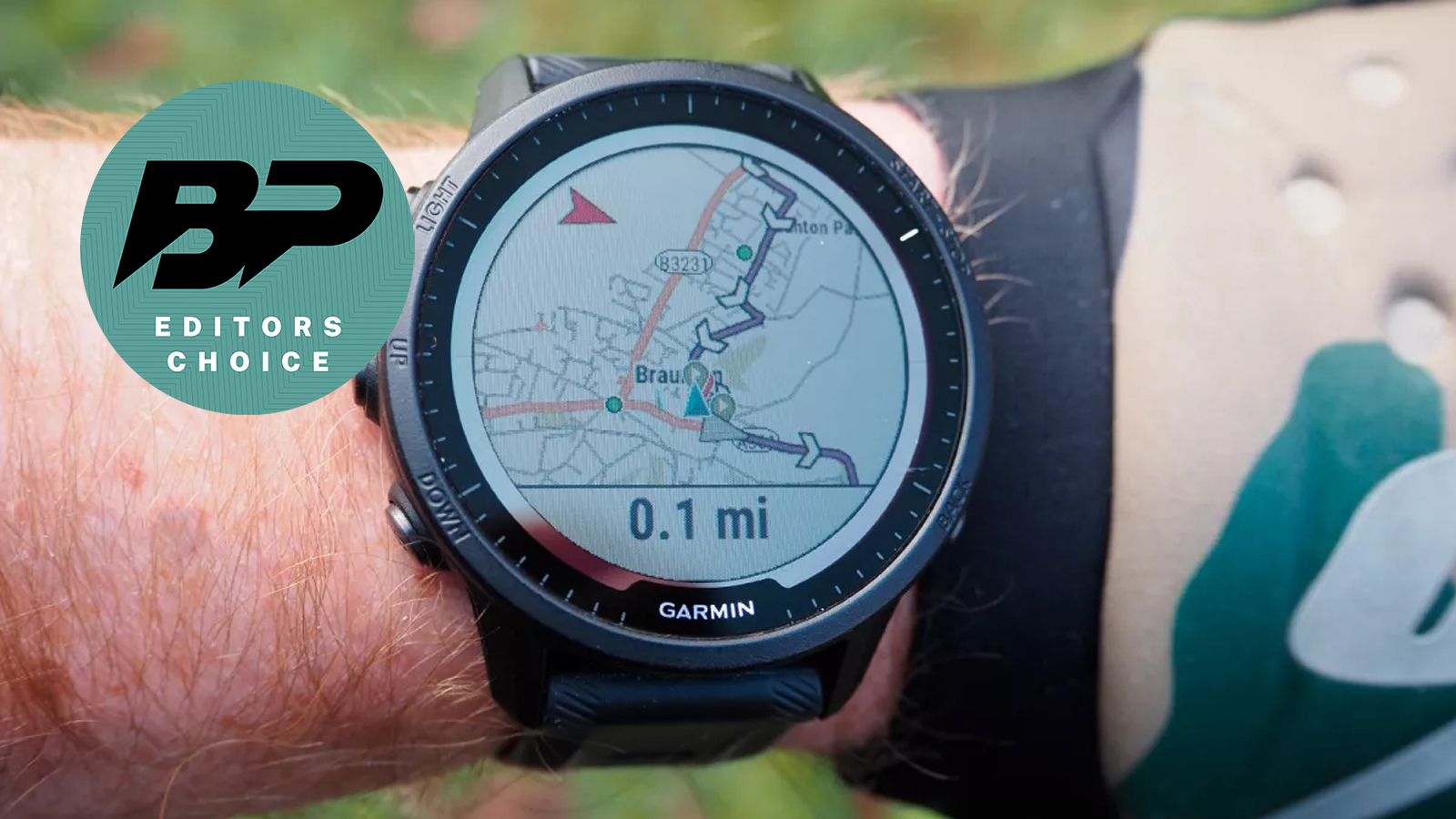
The 955 Solar is the top model in Garmin's Forerunner range of smartwatches. Released in 2022, along with a cheaper, non-solar version, the watch gets all of Garmin's latest health tracking and performance analysis tools into a model that's more lightweight and affordable than the likes of the Fenix range.
Being the flagship Forerunner means that unlike some older models, the 955 is the recipient of all the latest Garmin features which includes HRV (heart rate variability) measuring, Training Readiness and deeper insights into your workout performances. The only downside is that to get the most accurate measurements. you'll need to wear the watch 24-hours a day and you won't get certain aspects, such as HRV, until you've worn the watch for three weeks straight. This affects all Garmin watches with such facilities though, not just the Forerunner 955.
The full mapping is excellent and following routes is easy with timely notifications from the smartwatch when you need to make turns etc. When following pre-loaded routes, you get the benefit of Garmin's ClimbPro feature (lifted from their GPS bike computers). Garmin's MTB-specific stats Grit, Flow and Air Time are displayed via the Garmin Connect phone app after your ride. The 955 also auto connects with your e-bike's systems to give live stats on the watch, such as battery level, while you ride and more detailed bike and rider performance analysis via the app.
As for battery life, even with regular GPS tracked rides, you're likely to go more than a week between charges. Though with a smaller face than the Garmin Enduro series, solar charging is less effective. The 955 is compatible with Amazon Music, Garmin Pay, Tacx trainer control and can connect to a host of other Bluetooth and ANT+ devices.
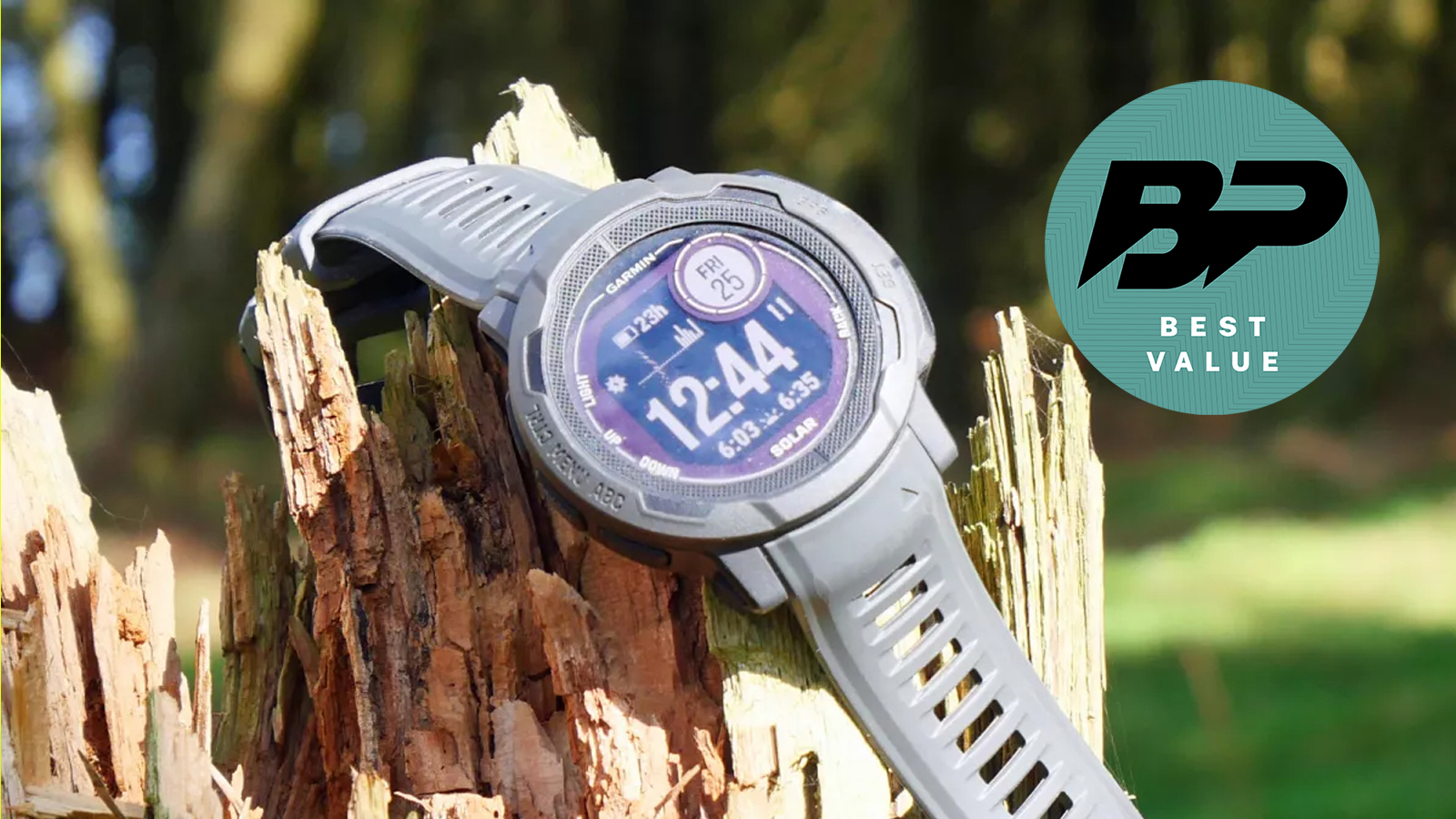
Garmin gave its entry-level adventure watch an overhaul last year and the new Instinct 2 is even better than before. It's packed with useful health metrics as well as the ability to track all manner of outdoor activities. We have found GPS accuracy to be plenty accurate even when riding in thick woodland.
The most notable feature is the new solar capabilities, using Garmin’s Power Glass screen the Instinct 2 has the capability of unlimited battery life in smartwatch mode or 48 hours in GPS mode. Not only does that cut down the number of times you need to charge your watch but it's also a massive advantage if you are looking to track big adventures.
As it sits at the bottom of Garmin’s rugged adventure range there are a few concessions when it comes to the spec. The screen is black and white rather than color, although it's very crisp and easy to read even in tricky light conditions. Mapping is also a weak point as it only has breadcrumb routes and a restrictive number of waypoints.
If you are just looking for a tough outdoor smartwatch to record your rides, runs, hikes, or whatever then the Instinct 2 is a great option and unless I really need navigation, the Instinct 2 has become my go-to for recording mountain bike rides.
The watch is available in two face sizes, with solar or the cheaper non-solar, as well as a range of different colors and activity-specific models too. See below for the Instinct 2 Crossover that has analog hands with a smartwatch background.
For more information, check out our full Garmin Instinct 2 smartwatch review.
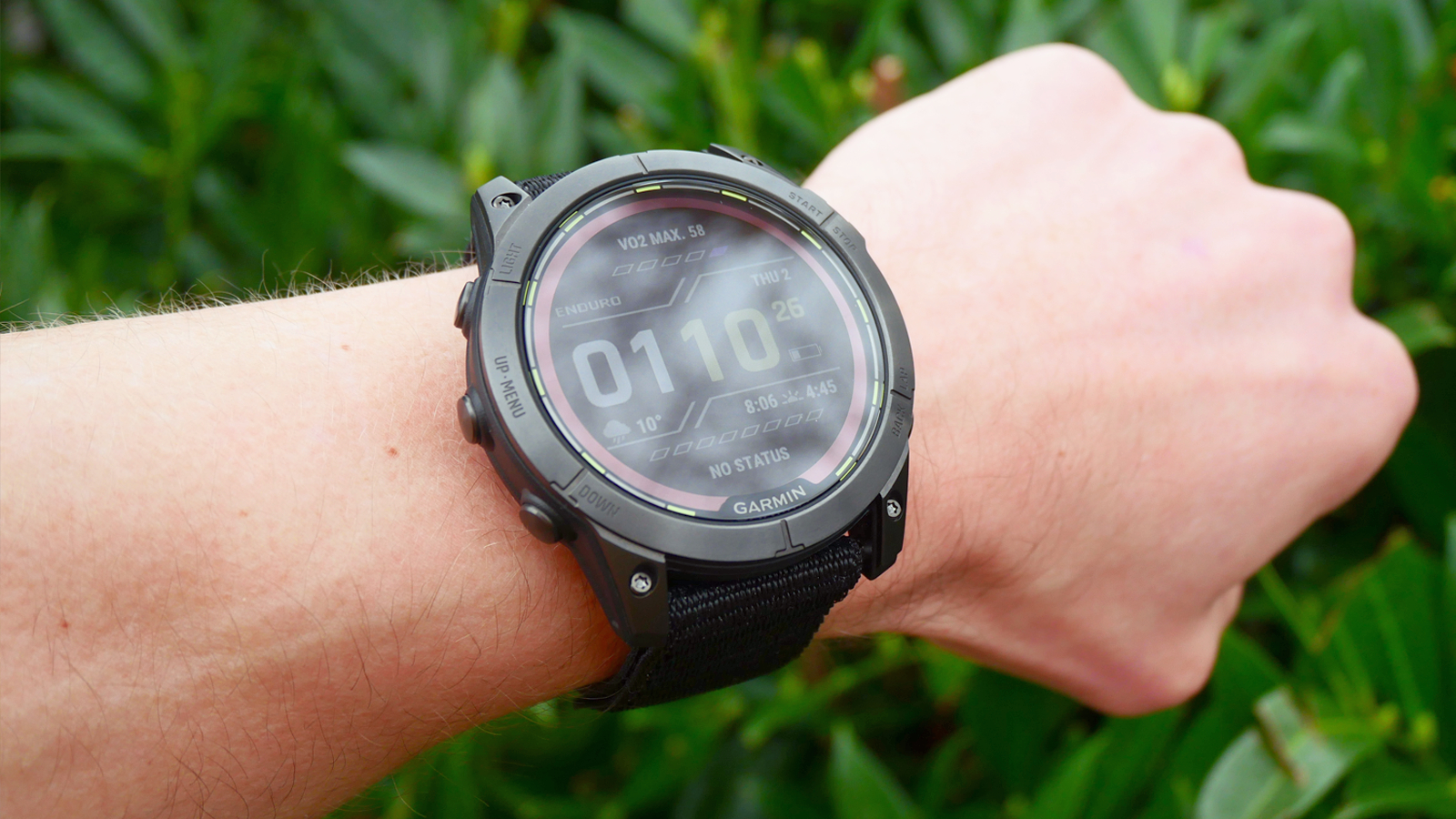
As with a lot of Garmin's updated tech, on the outside it doesn't look like much has changed between the Enduro 2 and Enduro, but look under the hood and there are a lot of updates that make the Enduro 2 a considerably more powerful smartwatch.
The exterior uses the same ultra-premium Titanium construction, material hook and loop strap, and button layout. However, the Enduro 2 adds a touchscreen to simplify menu navigation and mapping. Battery life is the big selling point of the Enduro series and the Enduro 2 offers 150 hours (with solar) of GPS recording, considerably more than its predecessor despite the day-to-day smartwatch battery life is quoted as less.
GPS accuracy has been improved as the Enduro 2 uses multi-frequency positioning if you're looking for pinpoint accuracy, which pairs nicely with the Enduro 2's new mapping capabilities. The new TopoActive Mapping means you can navigate without needing to be tethered to a phone. The mapping has loads of detail as well which makes navigation easy and during testing we found it to be a big upgrade on the very basic map display of the original Enduro.
The Enduro 2 has a load of new health and activity metrics as well. Real-time Stamina, Training Readiness, Training Status 2.0, HRV Status, and Morning Report features all feed into helping you train more effectively and perform your best out on the trail.
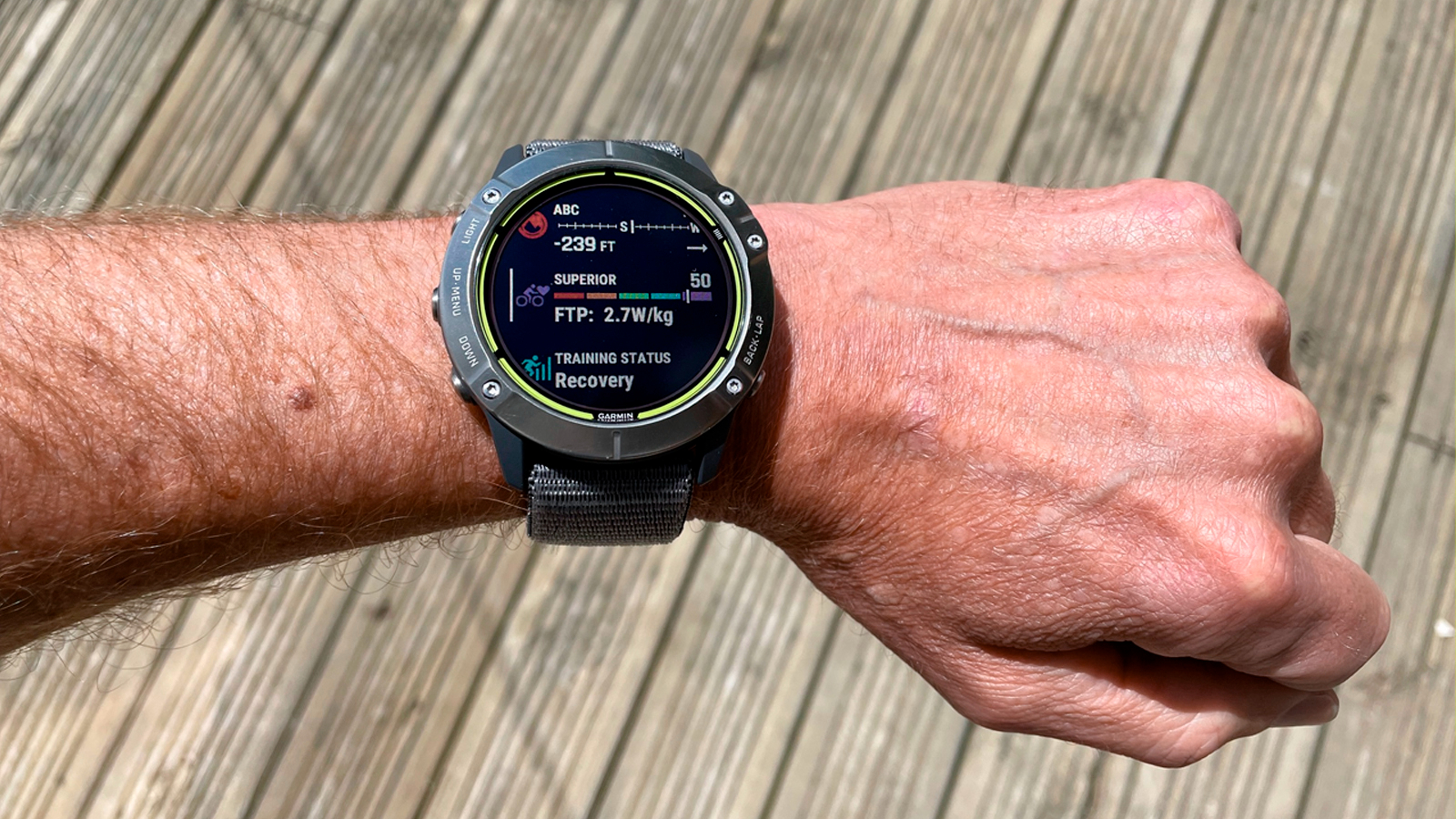
We've been testing the Garmin Enduro for a year now and it certainly lives up to its name. While this has nothing in particular to do with enduro racing, the smartwatch has a very impressive battery life, even if you're recording plenty of activities. The long intervals between charges are enhanced still further by solar charging as you ride and we went over a month during the summer before needing to plug the Enduro into the mains.
The payoff for longer battery life is less functionality and the Enduro falls short on that front when compared to the Garmin Fenix series, newer Forerunners and the Enduro 2. That said, it still has an impressive feature collection that includes heart rate monitoring, blood oxygen level measuring, MTB-specific data – aka Grit, Flow and Air Time (via the Garmin Connect app), suggested workouts and much more. The biggest drawback is that mapping is very basic and consists of simple routes rather than full maps and there's no music storage capacity either.
Despite these shortcomings, the Enduro is still an extremely useful smartwatch with good looks and an easy to read full color display. It's basically bombproof too as during testing it's been mistreated in just about every unfavorable condition imaginable. But despite being hammered by mud and grit, freezing temperatures, extreme heat and dust, and enduring many hours of cold winter surfing (yes, it has a surf mode), the Enduro is still scratch-free and in great condition – even the Velcro strap is only just starting to signs of wear after I thought would get shredded after a couple of months of hard use.
So if detailed maps aren't a priority and you're after a multisport smartwatch that needs minimal charging and will still look good after any abuse you can throw at it, then the Garmin Enduro is definitely well worth serious consideration.
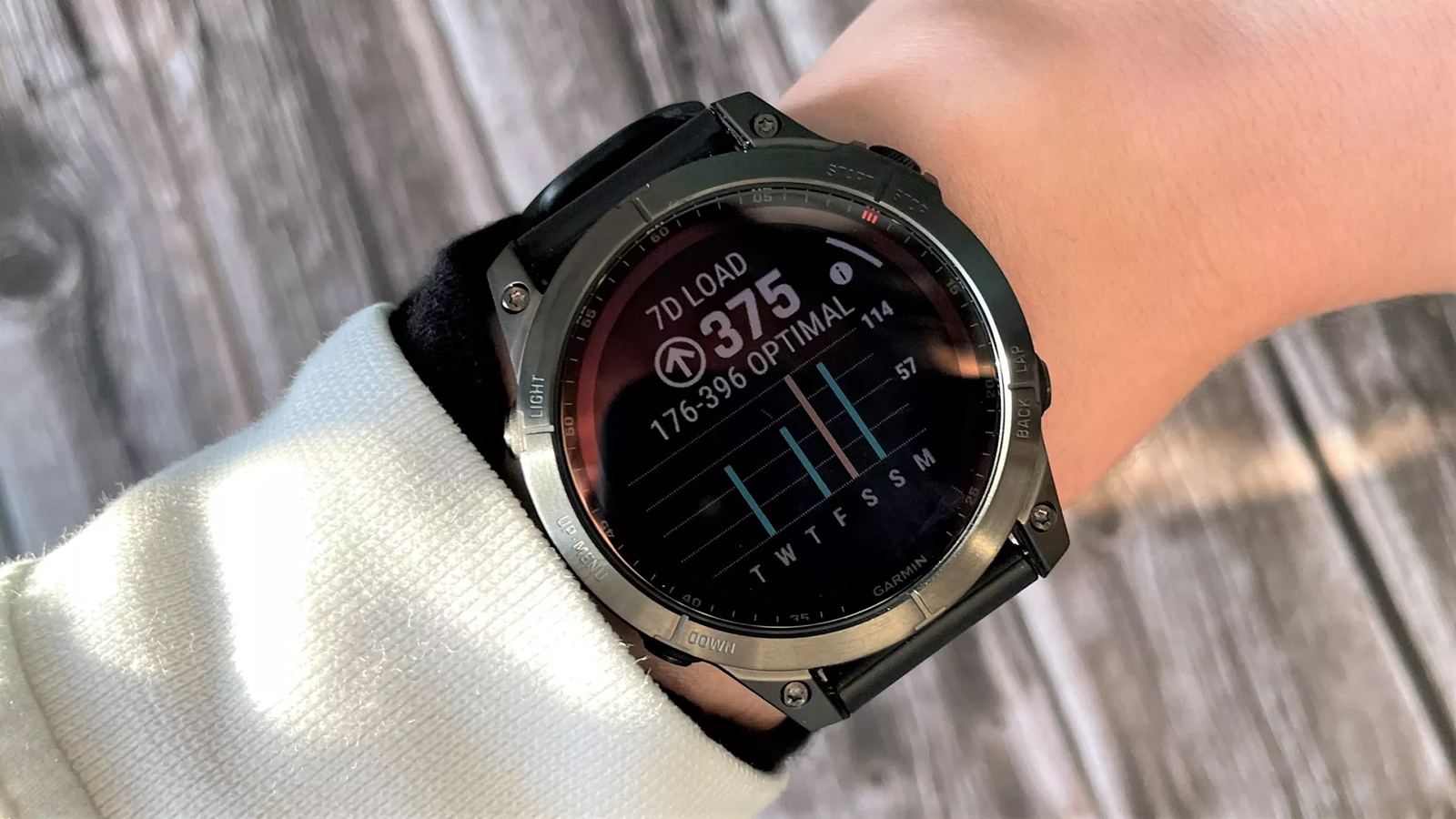
The Garmin Fenix 7 is a rugged multisport watch aimed at serious athletes who are looking to push themselves to the next level. It’s packed with features to help you best progress your training, with performance metrics, a recovery time advisor and a race widget. The real-time stamina feature is particularly useful, helping you track your exertion and pace yourself during events.
The addition of a touchscreen, an improvement on the Fenix 6, makes the watch much easier to operate and really comes into its own when you are navigating across maps. The GPS tracking and mapping are excellent, with plenty of free maps available to download. The watch’s heart rate monitor is extremely responsive, making this an excellent watch for high-intensity interval training.
The Fenix 7’s display does lack a little contrast, and the blue backlight means its colors can look a bit muddy, but overall it’s an impressive watch, packed with useful outdoor adventure features.
The Fenix 7 comes in three sizes (42mm, 47mm, and 51mm) and, as well as the Standard Fenix 7, is available in Solar, and Sapphire Solar models.
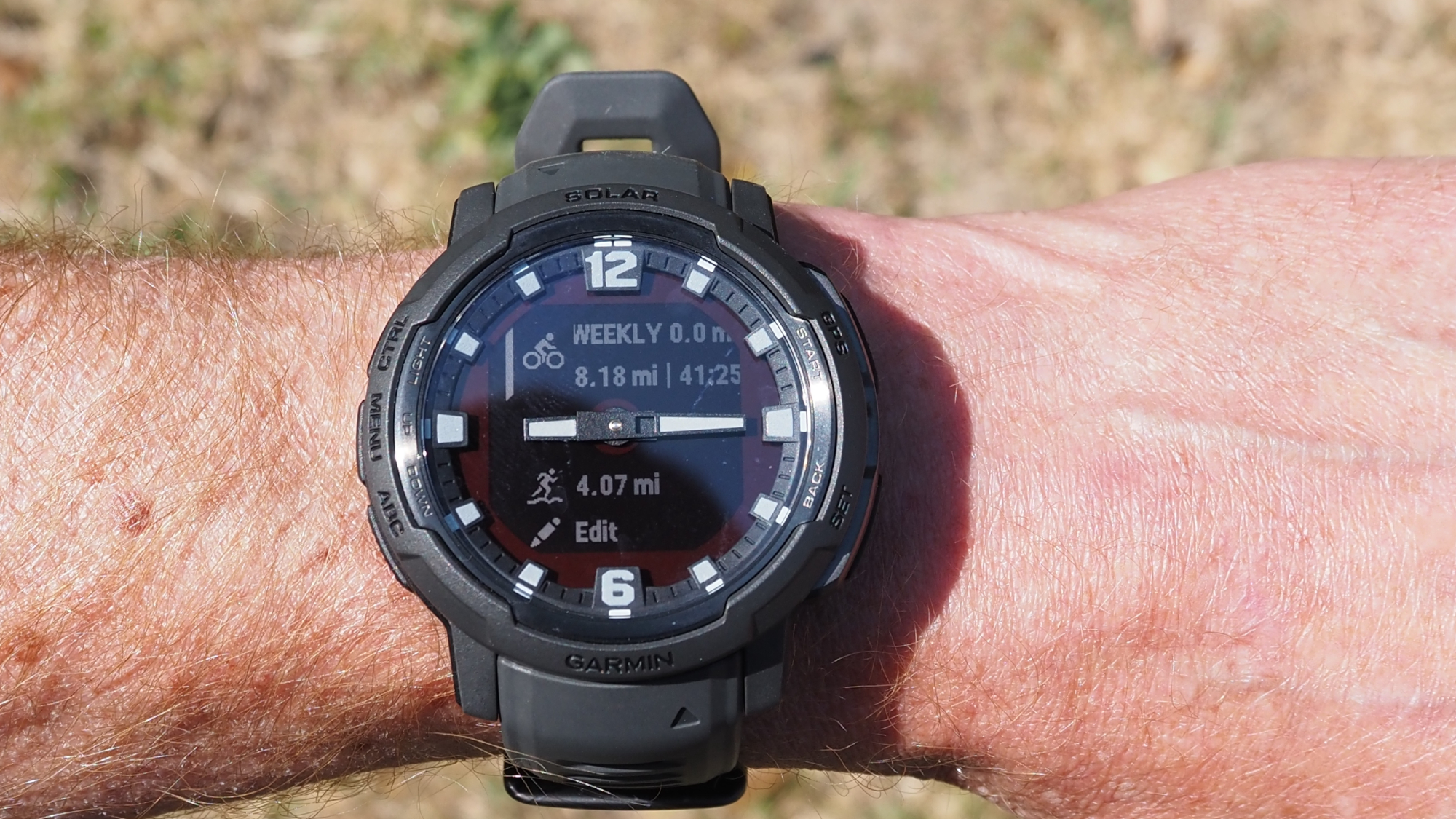
If you’re after something a little different, the Garmin Instinct Crossover blends smart multisport functionality with analog hands for a quirky, hybrid watch. It is basically a revamped Garmin Instinct 2, which uses satellite technology to ensure the analog hands deliver accurate timekeeping. When you press any of the function buttons, the analog hands rotate to get out of the way.
When it comes to onboard features, the Instinct Crossover is packed with the same health metrics, and training and tracking features as the Instinct 2 it is based on. However, due to its analog hands and sacrifices made to its screen, it doesn't have any topographical maps so it won’t be the watch for you if you’re looking for the best option to guide you through new terrain. You do get directional cues when following loaded routes though.
Overall, it’s a tad pricey considering it isn’t offering as many features as the Instinct 2, but if you want something more traditional looking, which still has advanced health and fitness metrics, it could tick all your boxes. The Garmin Instinct Crossover is also available in a cheaper non-solar model.
How to choose the best Garmin watch for MTB
How much should I spend on a Garmin Smartwatch?
Every modern Garmin smartwatch will give you ride tracking information, basic analytics and will sync with apps such as Strava via the Garmin Connect app, so you don't need to spend a fortune to get involved. Obviously, the more you spend, the fancier features get and you'll also have access to full mapping and masses of health and fitness analytics.
Older or more basic Garmin watches tend to cost around $/£200 to $/£300, but the cheapest recommended watch here, the Garmin Instinct 2, is usually a little more than that. At the other end of the scale, expect to spend around $/£1,000 for the latest top of the range models.
Are Garmin smartwatches really tough enough for the trails?
The short answer is yes. All the watches tested here have been subjected to serious amounts of abuse in every riding condition imaginable and have all passed with flying colors. They're not instructable of course, but our testers have had some hefty crashes wearing the watches and the Garmins have come out unscathed. They're all completely waterproof too.
Can I use a Garmin watch without a smartphone?
Yes, you can. All the watches here can function independently of a smartphone, though for the best results we suggest pairing them with the free Garmin Connect app.







